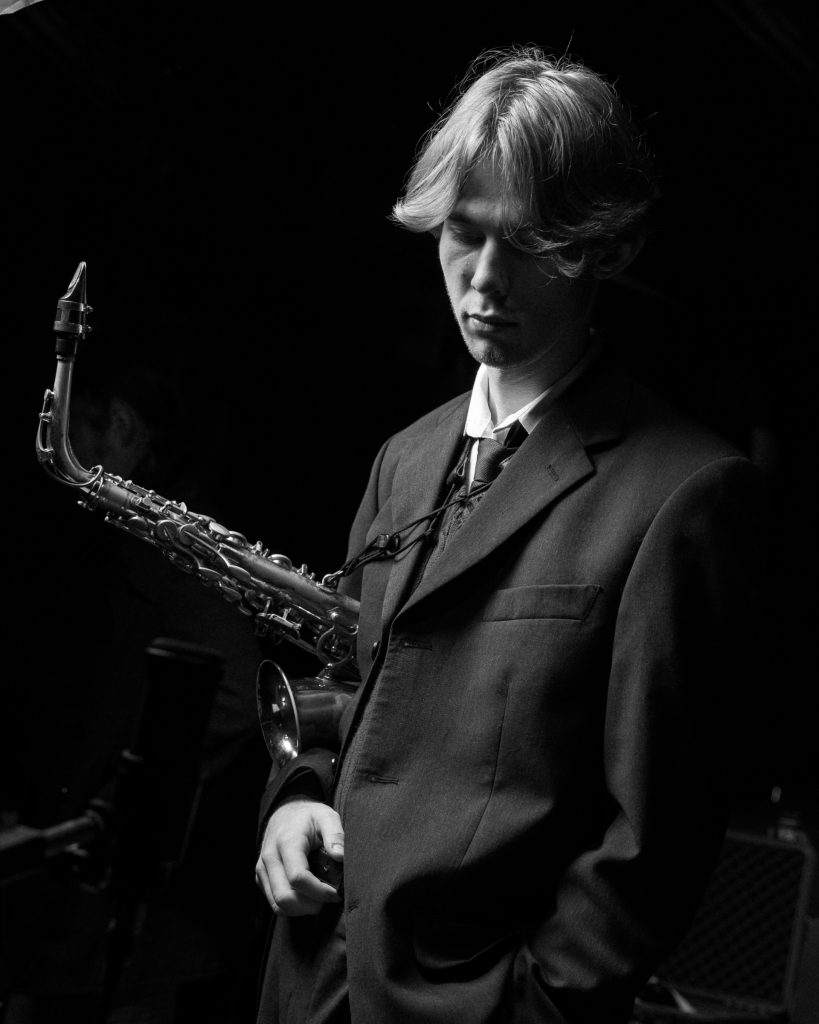Please tell us a little about yourself, where did your music journey start?
Back in high school I guess with all the band programs that were on but that was very much in the classical arena. I was in the big band in primary school, but I only really got into jazz when I was taking private lessons in early high school and my teacher actually suggested one of the summer clinics here so I came and did that. I then joined some of the youth programs and that was really rewarding. It just kind of proved to me that music was something you could actually do instead of a side hobby. I got to learn and be impressed by a lot of great musicians but also to hang out with older people as well. I did the Jazz clinic here (JMI) in grade 10 and after I finished that I was like “Well where do I go from here? I still have two more years with sitting at desks at school and being bored”. Then I somehow made it into the course!
What is one of your first memories of music?

I didn’t really listen to music growing up. So my first memory is probably piano lessons when I was really really young. My first memory of jazz music was listening to Hank Mobley: His Soul Station record. I put it on and I was listening to the first track (“Remember”). I would have been 12 maybe? But I remember I put it on and I was just listening through my phone speaker so I couldn’t hear the bass at all (but I probably wouldn’t have been able to hear the bass anyway!) I just remember it being so lively I guess and there was so much energy, but it was really pretty music at the same time. That album… all those guys are just so unbelievably locked in so it’s kind of like the perfect entrance into this music.
I was like “I just want to play with these guys and play how they play”.
Why is music important to you and how was it a part of your life before you studied it?
I’m going to start with the second half of that question. As I said, I never really listened to music growing up in my household. Mum and Dad never really listened to it so I had to teach myself to sit down and really listen. But playing was always a part of my life I guess. For me, throughout a lot of my earlier years music was just a way to actually connect with people. A lot of it would really only be with older people, in a lot of the jazz programmes. It was a way of connecting with them emotionally and socially, probably with a group I identified with.
I like how with music (specifically jazz); there’s so much to learn and you’re basically committing yourself to a life of constant growth and that’s a humbling kind of commitment. I don’t want to stagnate at any point in my life and so it’s almost a reassurance of the fact that if I keep working on it I won’t.
A whole bunch of other cliches as well like connection and community and expression is in there somewhere too. It’s a lot of things really.
When and why did you start studying at JMI?
I think people can limit themselves. They have a lot more potential than they give themselves credit for and people should just kind of go out and do things and take risks. Especially in Australia we have a lot of support from a lot of different places. You can look at things and go “That can turn out poorly”, but I guess if you believe in it and you’re constantly putting in effort you may as well just try something new.
What is your favourite thing about Jazz?
Sonny Stitt. Does he count? My favourite is probably ‘That’s The Way To Be’. It’s the only Stitt recording I found with him singing. It made me think,
“If Stitt can do it and make it sound cool and swinging I may as well at least start looking into it and learning (how to sing). I think I regret not starting the singing journey earlier”.
What is your dream career in music?
Look I guess the dream career is gigging as much as I can and just playing. But I’ve actually done a lot of thinking and work over the last little while about how a music career sounds to me. I guess there’s this interesting quote, I can’t remember the name for the life of me but it was a writer and she’s basically talking about her experience in writing. She said she made a commitment to being a writer from a very young age but she wasn’t technically “a writer” for quite a while. I don’t think of music as a career because I find that puts pressure on the craft and I don’t play as well if I’m worried about “how can I make money” or “Can I get as many gigs as possible”, which I’m still hungry for but that (way of thinking) demotivates me. If I think of it as a craft instead then I enjoy it. I’m also comfortable with the fact that I’ve got other interests outside music as well. I would love to go study a counselling degree after this, I think it would be interesting. And I see great musicians do it all the time, they have a day job and then play music as well. I do love the teaching aspect of it though, teaching at a tertiary level would be awesome but yeah, it’s mainly just about playing.
How has JMI influenced your relationship to music?
You’re just around a lot of really hard workers and it’s modelled to you both by peers, alumni and by staff.
I remember something Dan (Quigley) used to say, “You might not like some of the people you listen to but eventually you’ll catch the jazz bug” and that was the case. It’s like, I loved Stitt since I started; I hope that’s on record now forever! But yeah, I didn’t really like Coltrane to begin with or Parker was a struggle to get into. So, the more you listen to and the more you learn, the more you can kind of get into the music. I think just the opportunity to be inspired by other interested people and kind of chat and nerd out, but also it’s been a privilege this last year (third yeah) to give to some of the other students as well. I’ve done a lot of tutoring this year and I love it, just to be in that space and kind of give like people gave to me when I was in first year.
How do you feel about your capability as a musician so far into your study?
I don’t feel like I’m very far into my study to be honest with you.
I think there’s been an improvement in ability and confidence which has been a huge thing.
I walk away from gigs now actually feeling comfortable with what I contributed. I feel like if you asked me this question a year ago I probably wouldn’t feel this way but now I’m getting to a point where I can actually have a musical conversation and give ideas to another person to use. The only other thing I might add to that is I have become I think a much stronger band leader. It’s tricky thing to teach as well because it’s all reliant on the person’s own confidence and they really only get that from gigs or if it is being modelled. It had been awesome to see people like Dave Spicer or Nikki Parrott. Graeme (Norris) as well. There’s just so much experience I guess up on that stage but yeah, I think I’ve noticed a shift in confidence.
What was/is the best advice you received while at JMI?
I don’t think it was verbal necessarily – I think there’s just a lot of people here that model kindness and generosity, so it dips into being a good person. For me that stuff is really important because as much as I hate to admit it, I’m still in an early stage of growth. That modelling has been the best guidance I think anyone can really give. Musically, there’s a million things. Something I wish I’d heard earlier is “Sing everything you play”.
If you could give future students of music one piece of advice, what would it be?
Something you said the other day; “Trust the process”. Because it’s modelled to you, you’ve just got to trust that even though you’re not as good as people you want to be as good as, it’s not necessarily about trying to catch up but just to sit with things and spend time on small things that are interesting. I’ve noticed now I don’t really find any part of practise boring because there’s always something I’ve got to go study. It’s strange but I love it because there’s enjoyment to be had. Another one of the best pieces of advice I heard here (and it’s one of the toilet quotes!) “There’s fun in being serious” I think it’s Coltrane’s. I love that quote, I identify with it so much because every part of practise you can make kind of purposeful and there’s enjoyment with that and you feel so good afterwards. It’s just like, I did something that might be tricky but then it also just felt kind of fun
Anything else you would like to add?
Travel where you can. Or if you cant travel, connect with people from other parts of the world and other musicians. As much as I love Brisbane – it’s just completely different to other music cultures in all these other places. In Brisbane there can be some of the kindest and most genuine people in a lot of ways but I have felt on occasion a floweriness. Whereas when I went to Sydney it felt like a different kind of honesty that might be more direct. I think for first year the stable footing was really helpful, but that kind of direct honesty that I felt in Sydney and the States, which was harsh to be met with at times, but in terms of learning it’s a different level. I think travel is an essential part of being a creative in general and a human.
What are your top five favourite Jazz artists?
Sonny Stitt
Lucy Yegiazaryan
Baptiste Herbin
Bill Evans
Hank Mobley
